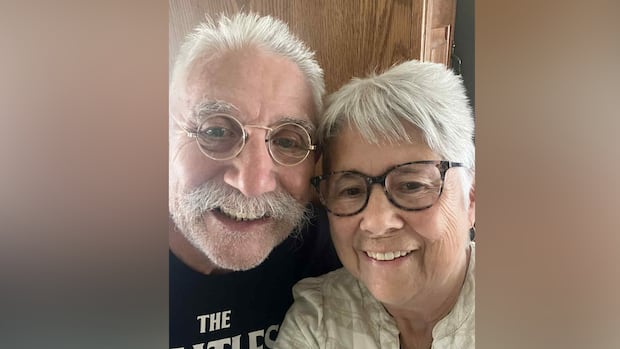ManitobaAn Interlake man who went to Gimli’s emergency department with chest pain this past March had to wait three days for an angiogram, because there was no ambulance available to take him to Winnipeg on the day of his appointment, his wife says.’Huge issue with being able to transfer patients in a timely manner,’ says Manitoba Nurses Union presidentJosh Crabb · CBC News · Posted: Oct 16, 2025 9:02 PM EDT | Last Updated: 2 hours agoGreg Klyne, who lives near Gimli, waited three days to get an angiogram in Winnipeg in March after his appointment was delayed due to a cancelled ambulance. (Submitted by Heather Klyne)An Interlake man who went to Gimli’s emergency department with chest pain this past March had to wait three days for an angiogram, because there was no ambulance available to take him to Winnipeg on the day of his appointment, his wife says.Greg Klyne, 72, was supposed to be transported to St. Boniface Hospital for the test on March 21, but that trip was cancelled and delayed until March 24, his wife, Heather Klyne, told CBC.”I was just frustrated, and I was ready to take him,” Heather said from her home just north of Gimli. “And that’s when the nurse had said, ‘The protocol is we can’t discharge him to you.'”It’s one example of the issues surrounding medical transports, according to union leaders in Manitoba who represent nurses and rural paramedics.”The problem is that it’s occurring all over this province,” said Manitoba Nurses Union president Darlene Jackson. “There’s a huge issue with being able to transfer patients in a timely manner.”Darlene Jackson, president of the Manitoba Nurses Union, says medical transports are an issue across the province. (Prabhjot Singh Lotey/CBC)The president of the Manitoba Association of Health Care Professionals, which represents rural paramedics, pointed to staffing vacancies across the province, including the Interlake.”Too many paramedics have chosen to leave being a paramedic, and they’re not being replaced fast enough,” said Jason Linklater.”We know right now in the Interlake-Eastern zone there’s 40 vacancies.”According to a Shared Health spokesperson, 87 per cent of full-time positions are filled in the province’s east zone, which includes the Interlake-Eastern Regional Health Authority. But there’s more work to do to address paramedic vacancies in the Interlake, the spokesperson acknowledged, and recruitment “remains a top priority.”Handivan service wants to helpThe challenges with medical transports have others looking for solutions.Age Mobility, which has two handivans stationed in Eriksdale — about 130 kilometres northwest of Winnipeg — and a third in nearby Ashern, already does some non-emergency medical transports. The organization is in the process of applying to become a stretcher service, says chairperson Keith Lundale, who is also a driver.Age Mobility chairperson and driver Keith Lundale hopes his organization can ease the burden on ‘overtaxed’ EMS personnel. (Josh Crabb/CBC)The hope is the handivans can help ease the burden on emergency medical services, who are “overtaxed at the moment … so they can provide exactly what they’re designed to do, [which] is emergent care,” said Lundale.Age Mobility currently has eight drivers, who are trained to give first aid and CPR.”I think we’re a valuable service,” Lundale said. “It’s just that we would like the government to recognize us as one. Let’s be a partner in the solution.”Age Mobility did 261 medical transports last year and has done nearly 200 this year, Lundale said.Shared Health’s spokesperson said the provincial health agency can’t comment on the use of handivans for medical transports in the Interlake region, because it only works with transporters who have a medical licence.However, Shared Health does contract Patient Transport Services, which has been providing service in the region since 2023, “to provide low acuity inter-facility transports throughout the Interlake,” the spokesperson said.Experience shakes confidence in systemAfter his ambulance was cancelled, Greg Klyne waited three days before being transported to Winnipeg for his angiogram, which showed everything was OK with his heart. Heather Klyne said the ordeal shook the couple’s confidence in the EMS system, and prompted her to write a letter to the premier’s office.“By the time I got a response from them, my husband was already out of the hospital, and so I had kind of given up,” Heather said.Greg Klyne got a test showing his heart was OK, but only after he waited in hospital an additional three days because of a cancelled ambulance trip. (Submitted by Heather Klyne)Progressive Conservative health critic Kathleen Cook said addressing paramedic shortages in Manitoba should be a priority.”There are patients who require paramedic-level care in an ambulance in order to be transferred,” Cook said. “That’s where the province’s focus needs to be.”The NDP government has so far failed to make good on its promise to hire 200 paramedics, Cook said.”If you look at the government’s updates on health human resources, you’ll find paramedics are conspicuously absent from those updates,” Cook said. She suggests Manitoba cover education costs, like some other jurisdictions do to recruit and retain paramedics.”We need to be seeing similar incentives offered in Manitoba to make sure that we’re competitive with other provinces,” said Cook.Kathleen Cook, the Progressive Conservative health critic in Manitoba, says incentives to cover education costs for people to work as rural paramedics could help address staffing shortages. (Justin Fraser/CBC)Numbers provided by the province earlier this month said 401 allied health professionals — the category paramedics fall under — have been hired since the New Democrats formed government in October 2023.A number specifically showing how many net new paramedics have been hired was not included. Health Minister Uzoma Asagwara acknowledges the pressures on medical transportation services, and says the government is working with Shared Health to address the problem.That includes expanding paramedic training “and building a sustainable EMS system that keeps ambulances available where they’re needed most,” they said in a statement.WATCH | Interlake handivan service wants to help ease pandemic shortage:Interlake handivan service wants to help ease paramedic shortageA handivan service in Manitoba’s Interlake region that offers transportation to medical appointments is looking to expand. As the province looks to fill paramedic vacancies, Age Mobility wants to become a stretcher service to help hospitals with non-emergency patient transfers. ABOUT THE AUTHORJosh Crabb is a reporter with CBC Manitoba. He started reporting in 2005 at CKX-TV in Brandon, Man. After spending three years working in television in Red Deer, Alta., Josh returned to Manitoba in 2010 and has been covering stories across the province and in Winnipeg ever since.
Wednesday, 4 Mar 2026
Canada – The Illusion
Search
Have an existing account?
Sign In
© 2022 Foxiz News Network. Ruby Design Company. All Rights Reserved.
You May also Like
- More News:
- history
- Standing Bear Network
- John Gonzalez
- ᐊᔭᐦᑊ ayahp — It happened
- Creation
- Beneath the Water
- Olympic gold medal
- Jim Thorpe
- type O blood
- the bringer of life
- Raven
- Wás’agi
- NoiseCat
- 'Sugarcane'
- The rivers still sing
- ᑲᓂᐸᐏᐟ ᒪᐢᑿ
- ᐅᑳᐤ okâw — We remember
- ᐊᓂᓈᐯᐃᐧᐣ aninâpêwin — Truth
- This is what it means to be human.
- Nokoma











